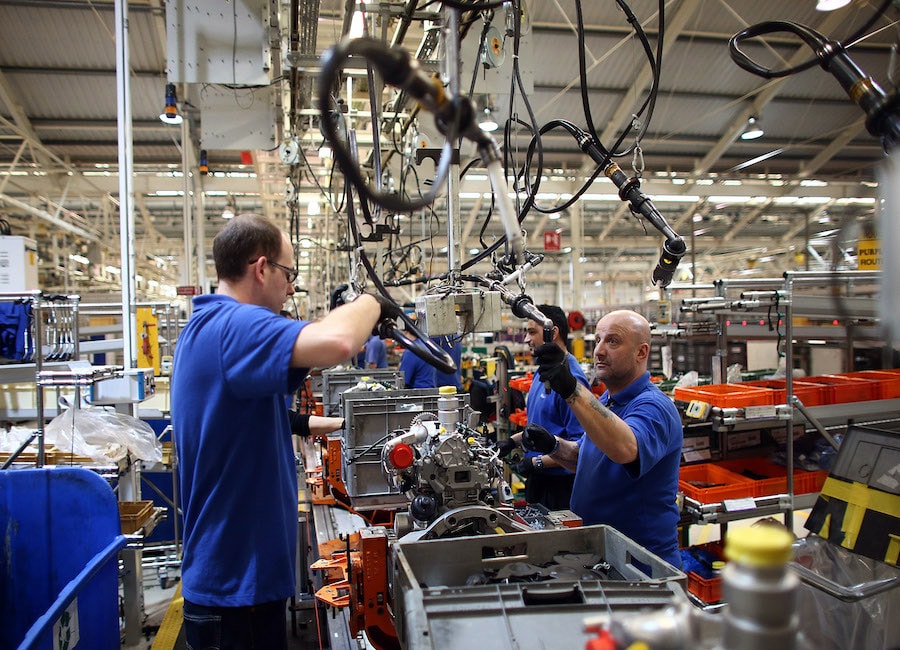Manufacturing output fell fractionally last month as the rate of input price inflation eased to a 19-month low, according to the latest AIB manufacturing purchasing managers' index (PMI) survey.
The overall PMI index registered a 51.5 reading in September, up slightly from a 22-month low of 51.1 in August, for the 24th successive month of improvement in the sector, although reading was below the long-term average of 52.3. Any figure above 50.0 represents an improvement.
"There was little change in the headline index in the AIB Irish Manufacturing PMI survey for September," said Oliver Mangan, chief economist at AIB. "The PMI rose to 51.5 from 51.1 in August and was close to the reading of 51.8 in July. This signals a further modest improvement in business conditions in the sector, but is below the long-run average of 52.3.
Much weaker readings, though, are being seen in the rest of Europe, with the flash September Manufacturing PMI in contraction territory at 48.5 in both the Eurozone and UK."
The minor increase was driven by a much weaker fall in output and a faster rate of employment growth and almost offset by a sharper decline in new orders -- which reduced pressure on a supplier delivery times, leading to a significant reduction in backlogs -- and a slower rise in stocks of purchases.
New orders, in fact, contracted for the fourth successive month, the longest such sequence since mid-2019, and the rate of decline was the fastest since January 2021 when the country had been plunged into lockdown once more.
New export orders also fell for the fourth month running, albeit at a modest pace. Lower demand reportedly reflected increased caution among customers due to the risk of a recession in the economy, high prices and geopolitical instability.
Production also declined for the fourth successive month, but the contraction was marginal and weaker than the drop in new work, reflecting efforts to clear backlogs. Incomplete work fell for the fifth consecutive month, and at the fastest rate since January 2021.
The comparatively strong trend in output versus new orders was reflected in another solid rise in stocks of finished goods, the third in succession and the fifth-sharpest on record.

The new orders to inventories ratio -- at its lowest level since May 2020 -- gave a sign of weak output over the coming months, but the 12-month outlook for production improved slightly from August while remaining at the second-lowest level in nearly two years.
Again, anecdotal evidence highlighted the threat of recession and inflation, but employment rose at the fastest rate for three months.
Irish manufacturers cut their purchases of inputs in volume terms for only the second time since early 2021 due to a drop off in demand as well as pressure on budgets from high raw material and energy prices.
Pressure eased on supply chains, with lead times lengthening to the smallest degree since November 2020, but the delayed delivery of previously ordered items led to a further rise in input stocks. Some firms mentioned recent bulk buying to avoid price increases.
Global shortages, the strong US dollar and high energy prices contributed to a steep increase in input prices, despite the rate of inflation falling to a 19-month low, reflecting weaker demand and reduced supply chain pressures.
The rate of output price inflation was little-changed from August's seven-month low, but still higher than in any survey period prior to July 2021.
"The Irish data for September were a bit of a mixed bag. New orders, including export orders, fell for a fourth consecutive month, a worrying sign reflective of weakening demand in the face of rising price pressures," Mangan said.
"Meanwhile, manufacturers cut their purchases of inputs for only the second time since early 2021. In terms of the 12-month outlook, sentiment rose only slightly from August, thus remaining near a two-year low, weighed down by high inflation and fears of recession.
"Despite some easing in supply and capacity constraints, inflationary pressures remain strong. Input costs continued to rise sharply, though the rate of increase slowed further to a 19-month low. Output price inflation also remained elevated, though again it has eased appreciably from earlier in the year."
(Pic: Getty Images)











